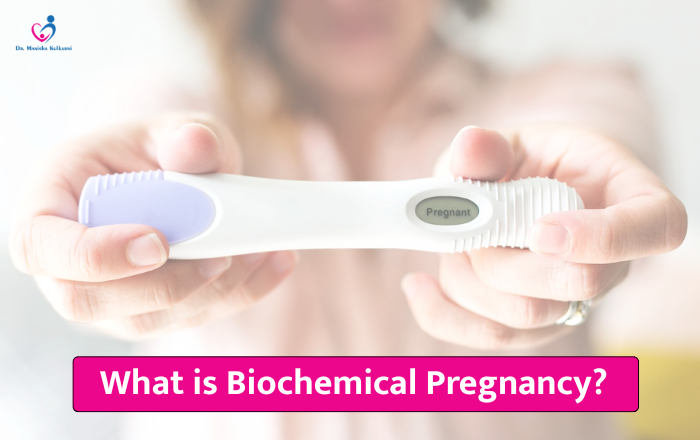Pregnancy can be an emotional rollercoaster—filled with hope, joy, and sometimes confusion. If you’ve taken a home pregnancy test and it showed positive, only to get your period a few days later, you’re not alone. This experience is more common than many realize and is often due to something called a biochemical pregnancy. In this blog, we’ll explain what a biochemical pregnancy is, how to recognize the symptoms, understand the causes, and what steps you can take if it happens. Whether you’re trying to conceive or just looking for clarity, this blog will help you navigate this topic with ease. What is a Biochemical Pregnancy? A biochemical pregnancy is a very early miscarriage that usually happens before the fifth week of pregnancy. It’s called “biochemical” because the pregnancy is confirmed only through a blood or urine test that detects the hormone hCG (human chorionic gonadotropin). At this stage, the embryo has implanted in the uterus, but it doesn’t grow enough to be seen on an ultrasound. Many people don’t even realize they were pregnant unless they had early testing. The pregnancy ends so early that it often feels like a slightly late or heavier period. Common Symptoms of Biochemical Pregnancy The signs of a biochemical pregnancy can be confusing because they’re similar to a normal period or early pregnancy symptoms. Here are some things to look out for: A faint positive on a home pregnancy test Mild cramping Vaginal bleeding or spotting a few days after the positive test A period that comes a bit later than expected Decreasing hCG levels if blood tests are done Keep in mind, not everyone has clear symptoms. Some only find out after routine fertility treatment blood tests or early pregnancy monitoring. Causes of Biochemical Pregnancy There’s no single reason why a biochemical pregnancy happens. It’s often nature’s way of stopping a pregnancy that isn’t developing as it should. Here are some common causes: Chromosomal abnormalities in the embryo Hormonal imbalances that affect implantation Uterine abnormalities that make it hard for the embryo to grow Infections or immune system responses Age-related factors, especially in women over 35 Lifestyle factors like smoking, excessive stress, or very low body weight It’s important to remember that a biochemical pregnancy usually isn’t caused by anything you did or didn’t do. How is a Biochemical Pregnancy Diagnosed? A biochemical pregnancy is usually diagnosed through: Home pregnancy tests: These detect hCG in your urine. You might see a faint positive line. Blood tests (beta hCG): These measure the exact amount of hCG in your blood. In a biochemical pregnancy, the levels start to rise but then drop quickly. No pregnancy visible on ultrasound: Since the pregnancy ends so early, it doesn’t develop far enough to show on an ultrasound scan. Doctors often confirm a biochemical pregnancy when a woman who tested positive later gets her period and the hCG levels drop to zero. Treatment & Recovery After Biochemical Pregnancy In most cases, no medical treatment is needed for a biochemical pregnancy. Since it happens very early, the body usually passes the tissue naturally, similar to a menstrual period. Physical recovery is quick, and most women return to their normal cycle within a few weeks. Emotional recovery may take longer, and that’s okay. Even though it was early, it’s still a loss, and it’s completely normal to grieve. If this happens more than once, or if you’re having trouble getting pregnant again, it’s a good idea to speak to a gynaecologist. Can You Get Pregnant Again After a Biochemical Pregnancy? Yes, in most cases, you can try again as soon as you feel ready—both physically and emotionally. Many women go on to have healthy pregnancies after a biochemical pregnancy. In fact, some doctors view it as a positive sign that you were able to conceive. If you’re trying to get pregnant again: Track your cycles Eat a healthy, balanced diet Reduce stress where possible Take folic acid or prenatal vitamins Talk to your doctor if you have concerns When to See a Specialist If you’ve had more than one biochemical pregnancy, or if you’re worried about your fertility, it’s time to speak with a qualified professional. You can visit Dr. Manisha Kulkarni, a well-known Gynaecologist in Magarpatta, who has helped many women manage early pregnancy concerns and menstrual health. Whether you’re dealing with irregular periods, trying to conceive, or recovering from early pregnancy loss, seeking the right advice can make a big difference. Frequently Asked Questions (FAQ) Q1: Is a biochemical pregnancy considered a miscarriage? Yes, it’s a very early form of miscarriage, usually before the fifth week of pregnancy. Q2: Can stress cause a biochemical pregnancy? Stress alone isn’t usually the cause, but extreme physical or emotional stress can affect hormone levels. Q3: Will I need treatment after a biochemical pregnancy? Most of the time, no treatment is needed unless the loss was part of a recurring pattern. A biochemical pregnancy can bring a mix of emotions—confusion, sadness, and sometimes guilt. It’s important to remember that it’s not your fault. These early losses are more common than you might think, and most women go on to have healthy pregnancies later. Give yourself time to heal. And if you’re unsure about what to do next, talking to a caring gynaecologist like Dr. Manisha Kulkarni in Magarpatta can help you take the next step with confidence.


